 2 citations,
January 2022 in “Eduvest”
2 citations,
January 2022 in “Eduvest” A teenage girl with a fungal scalp infection got better with antifungal and allergy medication, and special shampoo.
2 citations,
December 2019 in “Chinese medical journal/Chinese Medical Journal” A woman with a scalp infection and herpes recovered fully after treatment.
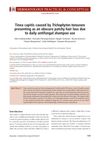 2 citations,
April 2015 in “Dermatology practical & conceptual”
2 citations,
April 2015 in “Dermatology practical & conceptual” Daily use of antifungal shampoo can hide symptoms and make it hard to diagnose fungal scalp infections.
2 citations,
January 1983 in “Archives of Dermatology” A 3-year-old boy's scalp infection was treated with ketoconazole.
 1 citations,
July 2023 in “Clinical case reports”
1 citations,
July 2023 in “Clinical case reports” Tinea capitis should be considered for scalp infections in infants.
 1 citations,
January 2023 in “Mycopathologia”
1 citations,
January 2023 in “Mycopathologia” A woman's hair loss and scalp swelling, caused by a fungal infection, was wrongly treated but eventually cured with Terbinafine, emphasizing its effectiveness.
 1 citations,
October 2022 in “Asian journal of medical sciences”
1 citations,
October 2022 in “Asian journal of medical sciences” Trichoscopy is a valuable, quick, and non-invasive tool for diagnosing tinea capitis in children.
 1 citations,
March 2022 in “Berkala Ilmu Kesehatan Kulit dan Kelamin/Berkala ilmu kesehatan kulit dan kelamin (Periodical of dermatology and venerology)”
1 citations,
March 2022 in “Berkala Ilmu Kesehatan Kulit dan Kelamin/Berkala ilmu kesehatan kulit dan kelamin (Periodical of dermatology and venerology)” Trichoscopy helps diagnose and monitor the treatment of fungal scalp infections in children.
1 citations,
October 2020 in “Cermin Dunia Kedokteran” A boy's scalp rash and baldness were cured using oral medication and medicated shampoo.
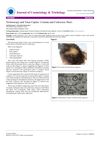 1 citations,
January 2016 in “Journal of cosmetology & trichology”
1 citations,
January 2016 in “Journal of cosmetology & trichology” Trichoscopy helped diagnose and treat a child's fungal scalp infection by spotting specific hair shapes.
1 citations,
March 2013 in “Clinical, cosmetic and investigational dermatology” The boy's hair loss was due to a hair-pulling disorder, not just a fungal infection.
1 citations,
November 2009 in “Nurse prescribing” Oral griseofulvin for 6-12 weeks cures most scalp fungal infections in children.
 September 2024 in “PubMed”
September 2024 in “PubMed” Timely and correct treatment is crucial to prevent complications and scarring in children with scalp ringworm.
May 2024 in “Journal of Fungi” Tinea capitis in adults, especially postmenopausal Black women, needs prompt treatment with oral antifungals to avoid scarring.

Neem leaf extract combined with eucalyptus and lemongrass oils can effectively treat Tinea capitis.

A rapid screening method using trichoscopy and clinical data can improve diagnosis and treatment of tinea capitis.
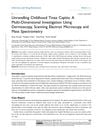 February 2024 in “Infection and drug resistance”
February 2024 in “Infection and drug resistance” Tinea capitis in a child was caused by a fungus from cats, highlighting the need for accurate diagnosis and treatment.
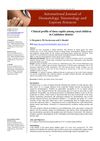 July 2023 in “International journal of dermatology, venereology and leprosy sciences”
July 2023 in “International journal of dermatology, venereology and leprosy sciences” Most rural children with scalp ringworm had a non-inflammatory type and early treatment is important to prevent complications.

Combining dermoscopy and calcium fluorescent white staining improves diagnosis and treatment of hair fungal infections.
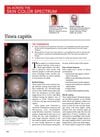 October 2022 in “The Journal of Family Practice”
October 2022 in “The Journal of Family Practice” Tinea capitis is a scalp fungal infection in children that can cause hair loss, scaling, and other symptoms.
 July 2022 in “Berkala Ilmu Kesehatan Kulit dan Kelamin/Berkala ilmu kesehatan kulit dan kelamin (Periodical of dermatology and venerology)”
July 2022 in “Berkala Ilmu Kesehatan Kulit dan Kelamin/Berkala ilmu kesehatan kulit dan kelamin (Periodical of dermatology and venerology)” Most tinea capitis patients were young boys with cat contact, had scaly patches caused by Microsporum canis, and improved with griseofulvin treatment.
 January 2022 in “Eduvest”
January 2022 in “Eduvest” A teenage girl with a fungal scalp infection got better with antifungal and allergy medication, plus medicated shampoo.
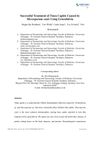 January 2022 in “International Journal of Research Publications”
January 2022 in “International Journal of Research Publications” Griseofulvin effectively treats tinea capitis caused by Microsporum canis.
November 2021 in “CRC Press eBooks” Tinea capitis is a fungal infection of the scalp that mainly affects children and can cause symptoms from mild itching to severe inflammation.
 January 2021 in “Advances in health sciences research/Advances in Health Sciences Research”
January 2021 in “Advances in health sciences research/Advances in Health Sciences Research” Two siblings with gray patch tinea capitis were successfully treated after identifying risk factors.
August 2019 in “Wiedza Medyczna” Kerion is a severe scalp infection that needs quick treatment to avoid permanent hair loss in children.
 April 2019 in “Dermatology reports”
April 2019 in “Dermatology reports” A 12-year-old boy's hair fully regrew after 8 weeks of treatment for tinea capitis, and dermoscopy was useful for diagnosis and monitoring.

Tinea capitis in adults often leads to misdiagnosis or delayed diagnosis due to atypical symptoms, requiring careful examination for proper treatment.
Griseofulvin is still the best treatment for tinea capitis.
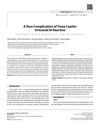 June 2017 in “Çocuk Enfeksiyon Dergisi/Journal of Pediatric Infection”
June 2017 in “Çocuk Enfeksiyon Dergisi/Journal of Pediatric Infection” Tinea capitis can rarely cause urticarial skin reactions in children.





















